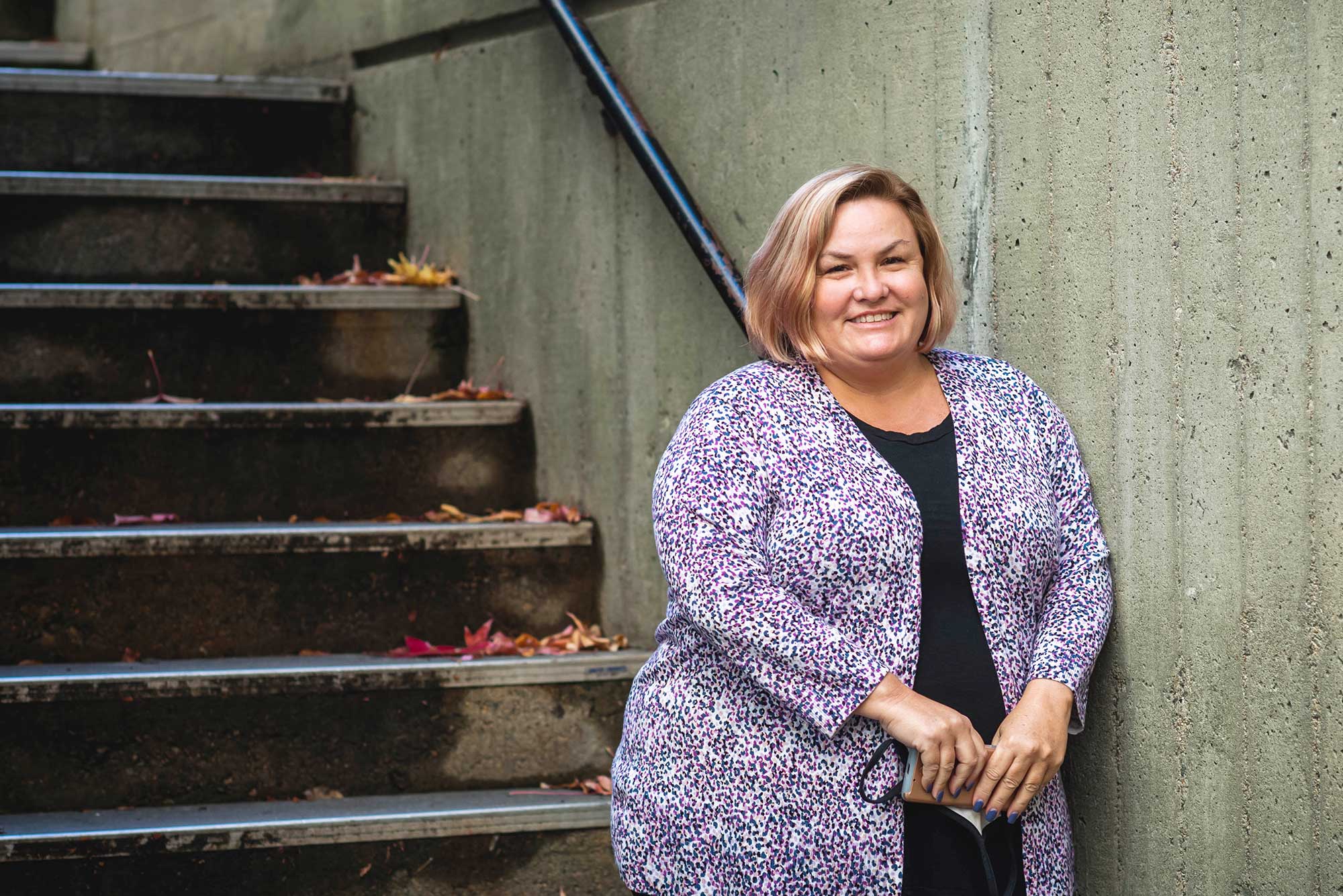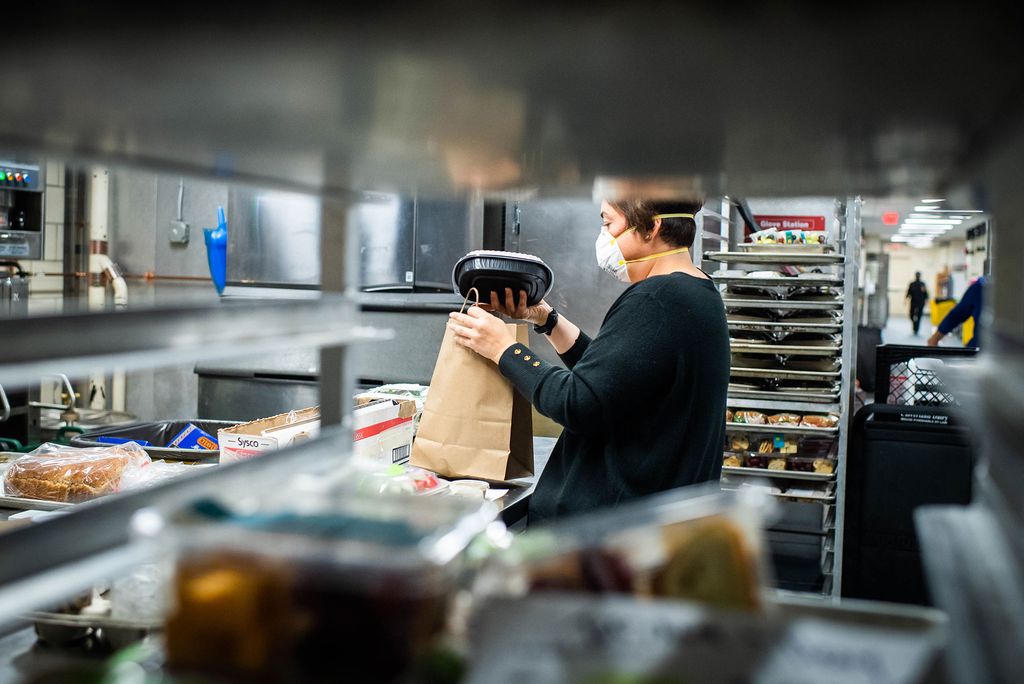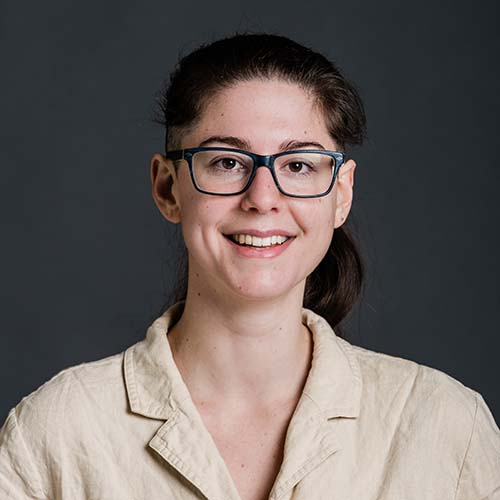Meet the Woman Responsible for Feeding Students in Quarantine

With over two decades of catering experience, Amy Goodrich was tasked with figuring out how to get food to students in quarantine housing.
Meet the Woman Responsible for Feeding Students in Quarantine
How Amy Goodrich and the catering operation she oversees are making sure students are well-fed
No student wants to end up in isolation or quarantine housing on campus, but those who do as a result of exposure to COVID-19 are being well-fed, thanks to a dedicated group of BU Dining Services employees.
Since the pandemic hit last spring, Amy Goodrich, director of catering at BU, and her seven-person team have worked tirelessly to figure out how to prepare and deliver tasty, nutritious food to students in quarantine.
Goodrich’s task is just one piece of the intricate puzzle that needed to be in place to ensure students could safely return to campus this fall. Administering over 25,000 COVID-19 tests to students each week, BU is among a small minority—just 6 percent—of US colleges routinely testing their students this fall, augmented by a robust contact tracing program, and self-screenings. Administrators knew establishing isolation and quarantine rooms (isolation for students with symptoms and quarantine for those who have come into close contact with someone who has tested positive) would be essential to mitigating any potential outbreaks.
But once students were unexpectedly confined to new quarters, how would they eat?
Peter Smokowski, vice president for auxiliary services, knew Goodrich would be up to the challenge. “On occasion, when we find ourselves faced with an unusual request or problem and we need a quick solution, my first thought is: let’s get Amy involved.”
Goodrich is no stranger to high-pressure situations and the need to pivot when the situation calls for it. With more than 20 years in the catering industry, her experience ranges from managing banquets at hotels to arranging the food for Harvard University’s annual commencement to catering private events for BU presidents and deans. It only made sense, Goodrich says, for catering to take on the task of feeding students in quarantine and isolation. “That’s what catering people are good at,” she says. “We spend a lot of time figuring out situations and working on logistics.”
When campus shut down last March, she and her team sprang into action, getting food to the roughly two dozen students who were in quarantine on campus. They put together nonperishable food boxes, found out where students were, and made deliveries across campus as needed. “That was very small compared to what we’re doing now,” Goodrich says.
In July, her team began preparing for students’ return the following month, unsure how many students might need to be placed in special campus housing. Working out of Bay State Underground, they packed 700 nonperishable food boxes with soup, crackers, oatmeal, cereal, mac and cheese, and more, then put them in the designated quarantine and isolation rooms on the Charles River and Fenway campuses. They also equipped the rooms with clean linens and household products like soap, sponges, and utensils and collaborated with chefs from residential dining to plan 14-day menus.
They then waited for Move-in.

As students began trickling into quarantine rooms, it quickly became clear that a weekly delivery of frozen meals and bulk items wasn’t going to cut it. One student recalls her experience in quarantine in late August: “I never thought I was a picky eater until I went in there… I missed the hot food from the dining hall as well as the ability to choose.” She wasn’t the only one who felt that way, and the catering team responded quickly, preparing and delivering fresh-made meals once, and soon after, twice a week. Now, fresh meals like sandwiches and salads are delivered to students every other day. At students’ request, the team has also added such items as tissues and cough drops to the boxes of nonperishables. Goodrich’s “team has risen to each and every challenge created by the pandemic,” Smokowski says, “including managing the mind-boggling logistics of fresh and nonperishable food delivery to multiple locations every day.”
While Goodrich’s team looks after students in quarantine on the Charles River Campus, students in isolation on the Fenway Campus have been in the hands of Kevin Moquin, Fenway Dining Services general manager. Smokowski says Moquin and his team have been getting “rave reviews for the personalized and high-touch service” they are providing to those in isolation. “It’s definitely been a huge team effort,” says Goodrich of his Fenway team. “We basically do the same things, so there’s a lot of sharing back and forth of recipes, knowledge, and labor to get this done.” To date, the two teams have delivered over 2,500 meals.
TikTok: an unlikely tool
Quarantined students say they are satisfied with the latest delivery schedule. “BU does a good job of making sure you’re well-fed,” says one of them, who was in quarantine housing in late October. “My favorite thing in the food deliveries was the fajita bowl.”
With someone on duty seven days a week, Goodrich and her team are making sure all students in quarantine are being looked after. While she is responsible for coordinating many of the logistics, she credits her team of catering managers for “lifting the boxes” and ensuring all the deliveries arrive on time.
The catering squad is also in constant communication with other groups across the University, such as Facilities, Residential Life, the Sargent Choice Nutrition Center, and Healthway staff to make the process more efficient. “We still meet every week to make our processes a little smoother,” she says.
Her diligence in refining the meal program has been integral to BU Dining this semester, says Paul Riel, associate vice president for auxiliary services. “Amy has a deep appreciation for customer service, which is evident in the amount of time and effort she and her team have dedicated to this initiative. She is a driving force.”
Beyond the usual tricks of the catering trade, Goodrich and company have added an unlikely tool to their operational arsenal: TikTok. The video-based social media platform proved invaluable at the beginning of the fall semester, Goodrich says, as students placed in isolation at other colleges during move-in took to TikTok to record their sometimes less than satisfactory isolation meals. There was the infamous lemon served as a side dish, a meal labeled “chicken caesar salad” that turned out to be a bag of tortilla chips and a packet of balsamic vinegar dressing, and steak salads sent to vegans.
“It was actually a great way for us to learn what we didn’t want to do,” Goodrich says, crediting her “social media–savvy” team for flagging the posts.
The team also kept an eye out for social posts from quarantining BU students. “If [there] was something they really didn’t like,” she says, “then we were able to get in touch with them,” to see if there was something else they could choose instead. For the most part though, the social media feedback from Terriers has been positive, and entertaining: “We loved watching them,” she says.
Goodrich and her team know how lonely the quarantine dining experience can be, especially for freshmen, and have tried to provide any comforts they can to help lighten the experience of eating alone. “We also try to make it a little fun,” she adds. Every Thursday, the team drops off special treats, like Ben & Jerry’s ice cream or apple crisp with whipped cream, to the quarantine rooms. And after student feedback, they’ve instituted GrubHub Fridays, where students can order from their favorite local eateries. That requires a lot of coordination and precision timing: staff must wait for deliveries from GrubHub drivers and then deliver the food to students in their quarantine housing.
Along the way, Goodrich has sought to re-create some of the unique dining hall experiences for students in quarantine. And yes, even quarantiners got to enjoy this year’s Lobster Night. Surveyed in advance, students had the choice of a lobster roll, a sirloin sandwich, a steak salad, or a salad with lobster meat. “We were not letting anyone miss it,” she says.
“One of the characteristics of BU dining is that there’s so much variety,” Goodrich says. That remains central to her team’s operation. “Being able to accommodate is what we like to do.”
And for those who find themselves stuck in quarantine over Thanksgiving break, there’s one bit of good news: Goodrich and her staff have already planned a traditional Thanksgiving meal with all the fixings.


Comments & Discussion
Boston University moderates comments to facilitate an informed, substantive, civil conversation. Abusive, profane, self-promotional, misleading, incoherent or off-topic comments will be rejected. Moderators are staffed during regular business hours (EST) and can only accept comments written in English. Statistics or facts must include a citation or a link to the citation.